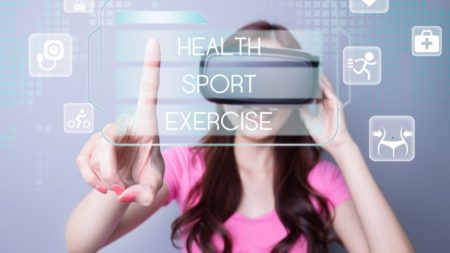I’m a VR enthusiast (not a Dr.) so this post shouldn’t be taken that seriously if you’re looking for professional medical advice. That said, I feel like I can answer a few common questions about if it’s healthy to play VR for outrageous time periods.
Let’s take this body part by body part shall we?
1) Cardiovascular System
Verdict: Extremely Healthy
I’m consistently shocked at how high I can get my heart rate up playing VR workout games. And I’m so enthralled with the game I don’t even feel like I’m exercising. Even better it can be done indoors at home without outrageous amounts of space (though you do need a little space).
VR won’t replace a lifting or sprinting regimen, but it is a significantly more intense and fun alternative to walking. After my first winter playing VR I felt like I was in better shape exiting a winter than I had been in several years! All without ever stepping foot in a gym during a global pandemic!
That’s pretty amazing considering I was just playing fun video games. And for me I think it outweighs any of the cons listed below.
2) Hands and Walls
Verdict: Not Healthy.
This is how VR is going to do the most damage to your body and property. It is way too easy to punch a wall (or a ceiling / floor) if you’re not careful. I have some tips about how to avoid punching your walls, but a VR noob is bound to punch at least 1 wall way too hard before learning their lesson and taking this more seriously.
I’ve personally broken some clocks / seriously injured my hand. So be careful.
3) Eyes
Verdict: Fatiguing. But, will improve with future headsets.
The whole “If you get too close to the TV it will damage your eyes” thing was always a myth. Screens simply don’t output enough electromagnetic radiation to physically damage an eye (we’ve tested this with science). If you’re worried about physical eye damage it’s much worse to go outside and have the Sun pounding your eyes with actual damaging radiation.
That said, the resolution on the Quest 2 sucks. And the cheap fresnel lenses on the device cause a lot of distortion if the lenses aren’t perfectly aligned with your eyes. Plus, the Quest 2 is hard to use with glasses if you didn’t have perfect vision to begin with.
Basically, this is about as healthy as staring at a blurry computer monitor would be. It’s not great but you’re likely to just experience fatigue and headaches. Temporary problems.
And in the near future they will make headsets with better resolutions, lenses, and that support prescriptions. So this may not be a big concern in 2024+.
4) Brain
Verdict: Inconclusive
This is a weird one to include. But, what a lot of people don’t realize is that most parts of vision happen with your brain and not your eyes. Your eyes collect light, your brain makes sense of the information it’s being provided with.
Well, in VR the information your brain is provided with gets super weird. Not only are things too often blurry (as mentioned above), oftentimes images are distorted, and the frames per second are too low.
Or sometimes you’re flying through space throwing space frisbees around. Or just moving around in ways that you never could in real life. Many of the most hardcore games out there can be quite disorienting.

Does this negatively impact your brain? Well it can definitely produce serious fatigue, headaches, motion sickness, etc. in the short term (all things I’ve experienced).
But, are there any long-term side-effects? This is where you might want to consult a real doctor and not a VR enthusiast. As far as I’ve read on the subject it’s inconclusive. I personally haven’t experienced any long-term side effects from my personal VR play that I’m aware of.
That said, one of the reasons VR companies tend to have a 13-year-old age limit on their headsets is because they’re worried about small children (who are still developing motor skills) to be messed up by huge amounts of VR play. Again more research is needed to prove this is a thing (or not a thing). But, it is a potential concern if you are an 8 year old. But also, no headsets recommend kids that young use their headset.
5) Joints
Verdict: Borderline Unhealthy
Assuming you play VR standing up for 2 hours at a time every night as a 300+ lbs man… That’s a lot of standing! And you will develop all the problems that people who stand a lot tend to develop (your feet and knees will hurt).
That said, I found this problem could pretty easily be remedied by simply buying a padded mat (this also helped my punching walls problem). I wouldn’t let this stop me from playing VR, it’s just something you need to be smart about.
Also worth mentioning is that a lot of VR games are punching games. If you punch hard and awkwardly enough you could definitely hurt your shoulder or something else. I wouldn’t say that’s a common injury, but I’ve definitely experienced weird VR injuries from quickly contorting my body in an awkward position in response to a game I was playing.
Conclusion
Once you figure out how to not punch so hard, accidentally hit your walls, and buy a mat VR is an overall pretty healthy activity.
In fact, the amount of exercise I get in VR probably greatly outweighs any of the negatives. I’m genuinely in better shape from playing video games.
That said, there will be fatigue involved from eye strain (until better headsets get released). I have accidentally punched walls and regretted it. I have hurt all sorts of body parts stretching in weird ways and from standing.
So VR is definitely not a panacea of health. But overall, the ability to exercise indoors trumps everything for me.


